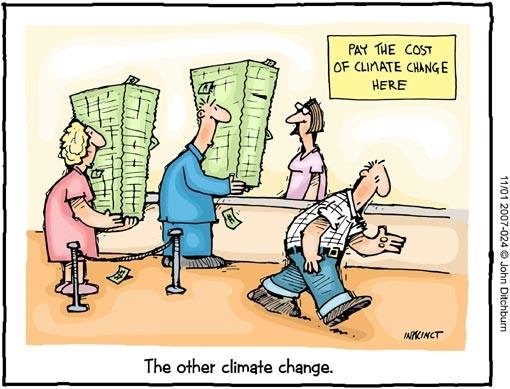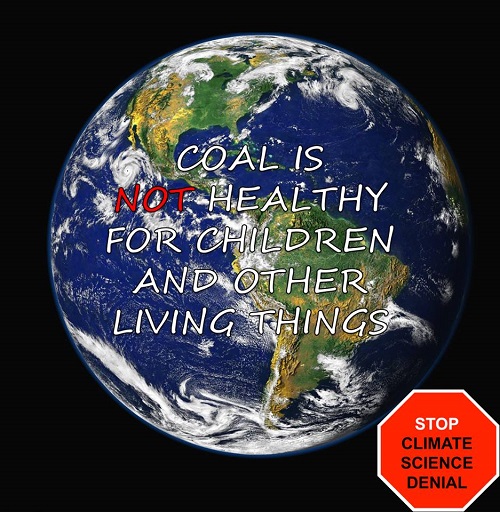2019 SkS Weekly Climate Change & Global Warming Digest #12
Posted on 24 March 2019 by John Hartz
Story of the Week... Editorial of the Week... Toon of the Week... Coming Soon on SkS... Climate Feedback Claim Review... SkS Week in Review... Poster of the Week...
Story of the Week...
This List Of Climate Change Solutions May Be Key To Reversing It
“Brilliant” is the word one source used to describe Project Drawdown’s ranked list of 100 climate change solutions, begging the meta question, should the list be on the list.
Having a variety of climate change solution options is only useful if everyone who should know they exist does know, making a credible list of climate solutions potentially as important as the solutions on the list.
In 2017, Project Drawdown, published the New York Times bestseller Drawdown, edited by the founder, Paul Hawken, 72. (Be sure to watch the full interview with Hawken in the player at the top of the article.)
Mehjabeen Abidi Habib, the author of Water in the Wilderness, based in Pakistan, the seventh most vulnerable country to climate change effects, serves on the Project Drawdown advisory board. She sees the effort as evidence “that it is not too late to make choices to change our world view and the actions that arise from the current paradigm.”
Jason F. McLennan, founder and chair of the International Living Future Institute and CEO of McLennan Design has known Hawken for years and notes that his work was mentioned in Drawdown. “I think it’s brilliant is the short answer,” he says. “It doesn’t spend time and energy on pointing fingers or criticizing things. It focuses on positive solutions.”
Congressman Tim Ryan (D-OH) who counts Hawken as a friend notes that the project is intended “not just to slow down climate change but reverse it.”
Daniel J. Siegel, MD, author of Aware: The Science and Practice of Presence and a clinical professor at UCLA School of Medicine agrees with the Congressman, adding, “My take on Project Drawdown is that it is a scientifically solid, insightful guide to some of the most important and effective steps we are taking to reverse global warming.”
Habib highlights the optimism embedded in the project. She notes that Hawken says in the introduction that climate change is “happening for us” to help us create a better world.
This List Of Climate Change Solutions May Be Key To Reversing It by Devin Thorpe, Forbes, Mar 22, 2019
Editorial of the Week...

Flooded graves are seen following a strong cyclone that hit Beira, Mozambique, on March 20, 2019. Five days after tropical cyclone Idai cut a swathe through Mozambique, Zimbabwe and Malawi, the confirmed death toll stood at more than 300 and hundreds of thousands of lives were at risk, officials said. YASUYOSHI CHIBA / AFP / GETTY IMAGES
These concerns comprehensively miss the point on the GND and the climate disruption it seeks to address. The GND is a non-binding resolution, which means it has precisely the same force of law as a non-binding resolution celebrating the fact that children enjoy ice cream cones. The GND exists for one reason: To finally get elected officials talking seriously about what we need to do in order to prepare for what is already here, what is definitely going to come and perhaps to mitigate the damage as best we can.
“Love the Green New Deal or hate it,” writes Justin Worland for Time, “the conversation it has unleashed represents a shift in the discussion surrounding climate policy in the U.S., with ripples that will spread across the globe. The outcome of the debate will go a long way toward determining if humanity can avoid the most catastrophic consequences of a rapidly warming world.”
Mozambique Is Drowning. Nebraska Has Flooded. We Need a Green New Deal. Opinion by William Rivers Pitt, Truthout, Mar 23. 2019
Toon of the Week...

Coming Soon on SkS...
- 3 clean energy myths that can lead to a productive climate conversation (Karin Kirk)
- Major study uncovers ‘sea change’ in world’s understanding of Atlantic conveyor belt (Daisy Dunne)
- The Green New Deal debate is in part about the absence of details (Bud Ward)
- Feeding 10 billion people by 2050 in a warming world (Kristen Pope)
- New research this week (Ari)
- 2019 SkS Weekly Climate Change & Global Warming News Roundup #13 (John Hartz)
- 2019 SkS Weekly Climate Change & Global Warming Digest #13 (John Hartz)
Climate Feedback Claim Review...
Caleb Rossiter falsely claims that climate models are “running very hot”
CLAIM
"The models predicted about three times the amount of warming in the world we’ve seen since [1988]."
VERDICT
![]()
SOURCE of CLAIM:
Carbon dioxide didn't create climate crisis, says leading skeptic by Julia Manchester, The Hill, Mar 6, 2019
REVIEW STATEMENT
Factually Inaccurate: Observed warming has consistently fallen within the range of climate model simulations over time.
KEY TAKE AWAY
Climate scientists use models to simulate and study different aspects of Earth's climate system, and to project the rate of global warming caused by human activities. These models do, in fact, simulate the rate of global warming well, and models run in the past accurately projected the rate of warming we are currently experiencing—that includes model projections from 1988.
Caleb Rossiter falsely claims that climate models are “running very hot” by Scott Johnson, Climate Feedback, Mar 11, 2019
Poster of the Week...

SkS Week in Review...
- 2019 SkS Weekly Climate Change & Global Warming News Roundup #12 by John Hartz
- New research, March 11-17, 2019 by Ari Jokimäki
- The climate papers most featured in the media in 2018 by Robert McSweeney (Carbon Brief)
- Editorial cartoonists lampoon, praise Green New Deal by Michael Svoboda (Yale Climate Connections)
- New rebuttal to the myth 'Holistic Management can reverse Climate Change' by Seb V
- 2019 SkS Weekly Climate Change & Global Warming Digest #11 by John Hartz































 Arguments
Arguments






























Why does the media give these people oxygen? Caleb Rossiter knows nothing about climate change. His qualifications are:
M.A., mathematics, American University (2004). [1]
Ph.D., policy analysis, Cornell University (1983). [1]
M.S., Education, Cortland State (N.Y.) University (1976). [1]
B.S., Human Development and Family Studies, Cornell University (1973).[1]
One or two quotes:
"He also proclaimed that carbon-based fuels improve life expectancy in developing countries by increasing the amount of CO2 in the atmosphere, acting as a “fertilizer,” and ensuring electricity generation, concluding:“I come not to bury your carbon but to praise it.” [8]
Woeful, just woeful. (In response to Rossiter's op-ed, the Institute for Policy Studies terminated his Associate Fellowship, telling him in an email..)
An article for The College Fix recounted the story of how Rossiter once flunked a student who had submitted a paper affirming the role of human activity in climate change:
“I had to raise her grade because she certainly had cited the evidence they had given, but I just couldn’t give her much of a grade because she should have been able to see – as most people should be able to see – that the computer models were just guessing and sort of notional, and just kind of playing around to get a good fit, but didn’t have much scientific basis.” [10]"
I don't usually use the term, but this is pure ignorance.
This is an interesting article by Bill McKibbins (founder of 350.org) that discusses how fast renewable energy will be adopted now that it is the cheapest energy. He says it might be fast enough to avoid the worst of climate change.
Encourage any effort to build out more renewable energy. Vote for politicians who support renewable energy.
You can have as many climate change solutions as you want and they will come to zilch, naada, cluum, shum devar, in short nothing as long as politicians depend on vested interests for the financing of their next election campaign.
william,
I agree that elected representatives 'dedicated to appealing to rich supporters/promoters' can be problem. And limiting the influence of rich people is part of the solution.
But wealth influencing an election is only a problem if those rich supporters/promoters are the type of people who have developed a willingness to pursue perceptions of status in ways that are harmful to Others.
A related problem is the pressure on elected representatives who would rather not appeal to those type of supporters/promoters. The power of misleading marketing can make elected representatives vote against their better judgment on some issues. They will do that because they believe, likely correctly, that they the need to vote that harmful way on that issue to continue to win the power to vote the helpful way they want to on other issues.
The real problem is not money influencing politics. The real problem is the ability of misleading political marketing to be done without penalty.
Setting up rules to limit who spends how much money does not address the real problem. Setting up laws that can be enforced to remove a candidate who benefited form misleading marketing is also not an easy answer. Offensive opponents can simply create misleading marketing that would then be the basis for removal of the non-offending candidate.
The real problem is the socioeconomic-political system that has developed. Systems that encourage people to 'develop a willingness to pursue perceptions of status in ways that are harmful to Others' will also develop resistance to correction. The fundamentals of the system causing the harmful developments is what needs to be corrected. Without the Errors in the System being corrected (more fundamental than money in politics), any attempted 'fixes' will struggle to be popular and profitable enough to be successful.
Both OPOC and William are right. It's obviously not just one thing operating here. There is another issue, namely political lobby groups. I have lost count of the times politicians have had sensible positions on issues on entering politics then changed their minds after talking to lobby groups. Policies get watered down to nothing.
Political lobbying is a huge industry particularly in America. The theory is enough lobby groups should cancel each other out, but industry lobby groups have vastly more expertise and funding than public interest lobby groups, environmental groups etc. I dont believe that its a level playing field. The issue is all magnified further by campaign financing coming from the same corporates.
It's all become toxic and lopsided in favour of corporate and right wing economic agendas. Too much of this lobbying is in private. It could be changed with rules favouring transparency and some form of limitation on lobbying.